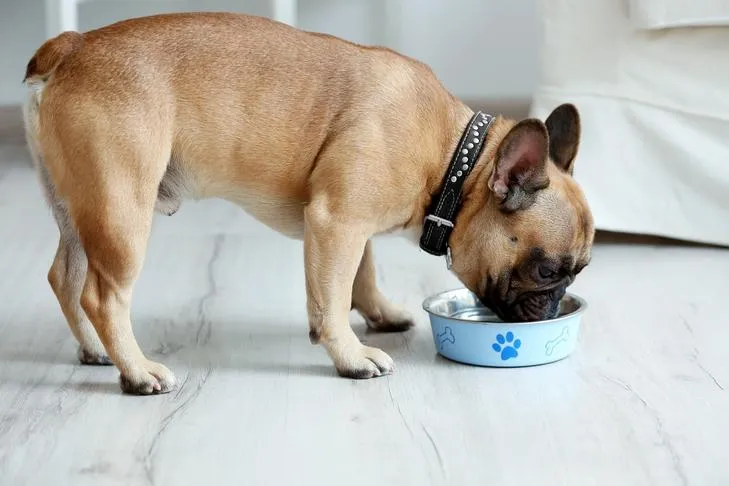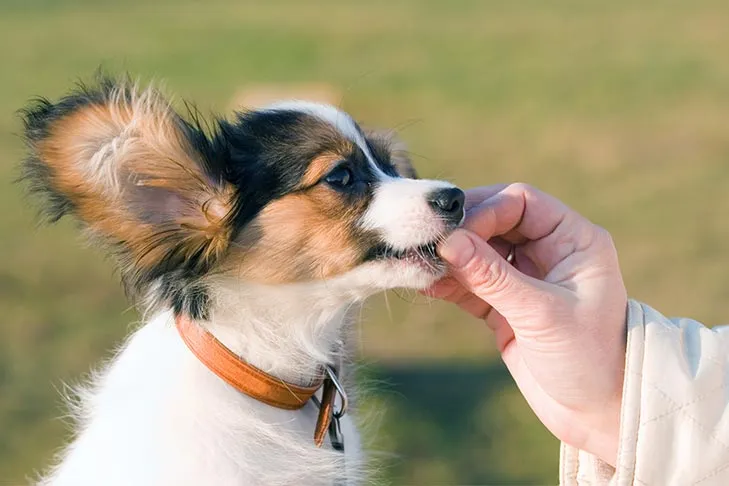Introduction: Feeding Your Furry Friend Safely
As loving pet parents, we often find ourselves wondering which human foods are safe to share with our beloved canine companions and which ones could pose a serious risk. Providing a balanced and nutritious diet is paramount for your dog’s health and well-being, but occasional treats from your plate can strengthen your bond. However, not all human foods are created equal in the canine digestive system. Understanding what foods dogs can have and not have is crucial to prevent unnecessary illness and ensure your dog remains healthy and happy. This comprehensive guide will help you navigate the world of human foods, highlighting safe options and dangerous toxins, empowering you to make informed decisions for your furry family member. Just as a growing puppy has specific nutritional needs, it’s vital to be aware of what can a 3 month old puppy eat to ensure a healthy start.
I. Human Foods Dogs Can Safely Enjoy (In Moderation)
Many everyday human foods can be healthy and delicious treats for your dog when given in appropriate portions and prepared correctly. Always remember that these should only supplement their balanced dog food, not replace it.
Bread
Small amounts of plain bread are generally safe for dogs, provided it contains no spices or toxic ingredients like raisins. While it offers no significant health benefits and can be high in carbohydrates and calories, a small, unseasoned piece occasionally won’t cause harm. Homemade bread without preservatives is a slightly better option, but it’s best to keep it as an infrequent treat.
Cashews
Cashews are acceptable for dogs in limited quantities. They contain beneficial nutrients such as calcium, magnesium, antioxidants, and protein. However, despite being lower in fat than some other nuts, overfeeding can contribute to weight gain. Always offer only unsalted cashews as a rare treat.
Cheese
Dogs can eat cheese in small to moderate amounts, provided they don’t exhibit lactose intolerance (which is uncommon but possible). Cheese can be a high-value treat. Opt for lower-fat varieties like cottage cheese or mozzarella to avoid excess fat. Many dogs also enjoy specialized dried cheese chews designed specifically for them.
 Dog's head resting on kitchen table looking at cheese.
Dog's head resting on kitchen table looking at cheese.
Coconut
This versatile fruit offers potential health benefits due to its lauric acid content, which may help combat bacteria and viruses. Coconut can also contribute to fresher breath and may alleviate certain skin conditions like hot spots, flea allergies, and itchy skin. Both coconut milk and coconut oil are considered safe for dogs. Crucially, ensure the hard, fibrous outer shell is removed entirely, as it poses a choking hazard or can cause intestinal blockage.
Corn
Corn is a common ingredient found in many commercial dog foods, and plain, cooked corn kernels are safe for dogs. It’s a source of carbohydrates, protein, and antioxidants. However, the corn cob itself is indigestible and can cause a serious intestinal obstruction if swallowed. Always remove kernels from the cob before sharing.
Eggs
Fully cooked eggs are an excellent source of protein and essential nutrients for dogs. They can even be helpful for settling an upset stomach. It’s vital to cook eggs thoroughly, as raw egg whites contain avidin, which can interfere with biotin absorption, potentially leading to a biotin deficiency over time.
Fish
Cooked fish can provide a healthy boost to your dog’s diet, rich in beneficial fats and amino acids. Salmon and sardines are particularly advantageous. Salmon is packed with protein, vitamins, and Omega-3 fatty acids, promoting joint and brain health. Sardines offer soft, digestible bones that provide extra calcium. For most fish, meticulously remove all tiny bones before feeding, as they can splinter and cause internal injury. Fish should always be fully cooked and cooled, and offered no more than twice a week. Never feed raw or undercooked fish due to the risk of parasites.
Ham
While a small piece of cooked ham won’t harm your dog, it’s not the healthiest option. Ham is typically high in sodium and fat, which can lead to digestive upset or contribute to pancreatitis with regular consumption. It should be an occasional, small treat, with lean, unseasoned portions preferred.
 French Bulldog eating from a bowl happily.
French Bulldog eating from a bowl happily.
Honey
Honey is a natural powerhouse of nutrients, including various vitamins, minerals like potassium and calcium, and antioxidants. Small amounts of local honey might even help dogs with seasonal allergies by introducing trace amounts of local pollen, potentially building immunity. Beyond consumption, raw honey can also be applied topically to minor burns and superficial cuts for its natural antiseptic properties.
Milk
Dogs can have small amounts of milk, but caution is advised. Many adult dogs are lactose-intolerant, meaning they lack the enzyme needed to properly digest lactose, leading to digestive upset such as diarrhea or gas. While a tiny splash is usually fine, observe your dog for any adverse reactions. Water remains the best and safest hydrating option.
Peanut Butter
Unsalted, raw peanut butter is often a favorite treat and an excellent source of protein, healthy fats, and vitamins (B and E) for dogs. However, it is absolutely critical to read labels carefully and ensure it does not contain xylitol, a common artificial sweetener that is highly toxic to dogs, even in small amounts. Always choose natural, unsalted varieties without added sugars or sweeteners.
Peanuts
Unlike macadamia nuts, plain peanuts are safe for dogs in moderation. They are rich in healthy fats and protein, which can benefit your dog’s energy levels and skin health. However, due to their fat content, too many can cause digestive upset or pancreatitis. Always offer unsalted, plain peanuts to avoid excessive sodium, which is difficult for dogs to process.
Popcorn
Unsalted, unbuttered, and air-popped popcorn can be a safe and fun treat in moderation. It contains beneficial nutrients like riboflavin and thiamine, which support eye health and digestion, along with small amounts of iron and protein. Ensure all kernels are fully popped, as unpopped kernels can pose a choking hazard or cause dental damage.
Pork
Cooked, lean pork is a highly digestible protein source packed with essential amino acids. While it can be higher in calories than other meats, it’s generally well-tolerated and may even be less likely to cause allergic reactions in some sensitive pets. Always feed plain, boneless, well-cooked pork, free from seasonings, onions, or garlic.
Quinoa
Quinoa is a nutrient-dense whole grain that can be found in some high-quality dry dog foods as a healthy alternative to starches like corn, wheat, and soy. When cooked and fed plain, it offers a good source of protein, fiber, and various minerals, contributing to a balanced diet.
 Samoyed puppy lying peacefully in green grass outdoors.
Samoyed puppy lying peacefully in green grass outdoors.
Salmon
As mentioned, fully cooked salmon is an outstanding source of protein, healthy fats (Omega-3s), and amino acids, vital for promoting a shiny coat, strong joints, cognitive function, and a robust immune system. However, consuming raw or undercooked salmon is extremely dangerous, as it can contain parasites that cause “salmon poisoning disease.” Symptoms include vomiting, diarrhea, dehydration, and can be fatal if untreated. Always ensure salmon is thoroughly cooked to eliminate these parasites.
Shrimp
A few cooked shrimp now and then can be a healthy snack for your dog. Shrimp are low in fat, calories, and carbohydrates, while being rich in antioxidants, vitamin B-12, and phosphorus. It’s crucial that shrimp are fully cooked and that the shell, including the tail, head, and legs, is completely removed before offering them to your dog.
Tuna
Dogs can consume small amounts of tuna. Cooked, fresh tuna is an excellent source of Omega-3 fatty acids, which support heart and eye health. For canned tuna, choose varieties packed in water (not oil) and without added spices. Due to potential mercury content in larger fish like tuna, and sodium in canned products, it should only be given sparingly as an occasional treat.
Turkey
Plain, cooked turkey is safe for dogs and is a good source of lean protein. When preparing turkey for your dog, always remove excess fat and skin, as these can be difficult to digest and may cause pancreatitis. Crucially, ensure all bones are removed, as poultry bones can splinter during digestion, leading to blockages or internal tears. Always feed turkey without any seasonings, onions, or garlic.
Wheat or Grains
Contrary to popular belief, most dogs do not need to be on a grain-free diet. Grains like wheat, corn, rice, and oats are valuable sources of protein, essential fatty acids, and fiber in a dog’s diet. If your dog has a diagnosed grain allergy, then avoiding them is necessary. Otherwise, healthy grains contribute positively to overall nutrition.
Yogurt
Plain, unsweetened yogurt can be a perfectly acceptable snack for dogs and offers beneficial probiotics that can help strengthen the digestive system. However, similar to milk, some dogs may struggle with digesting dairy products. Always choose plain yogurt without any added sugars or, more importantly, artificial sweeteners like xylitol, which is toxic.
 Papillon puppy gently taking a treat from a human hand.
Papillon puppy gently taking a treat from a human hand.
II. Human Foods Dogs Absolutely Cannot Have (Toxic and Dangerous)
Knowing which foods are poisonous to dogs is just as important as knowing which are safe. Ingesting these toxic items can lead to severe illness, organ damage, or even death. Always keep these foods out of reach and consult your veterinarian immediately if you suspect your dog has consumed any of them. For breed-specific dietary insights, you might also want to explore what can huskies eat and not eat, as certain breeds can have unique sensitivities.
Chocolate
Perhaps the most well-known toxic food for dogs, chocolate contains theobromine and caffeine, which dogs metabolize much slower than humans. Even small amounts can cause vomiting, diarrhea, tremors, seizures, and in severe cases, heart problems or death. Dark chocolate and baking chocolate are the most dangerous.
Grapes and Raisins
These seemingly innocent fruits are highly toxic to dogs, capable of causing acute kidney failure. The exact toxic substance is unknown, and even a small amount can be dangerous. Symptoms include vomiting, lethargy, decreased appetite, and abdominal pain.
Xylitol
This artificial sweetener is found in many sugar-free products like gum, candies, toothpaste, peanut butter, and baked goods. Xylitol is extremely toxic to dogs, causing a rapid release of insulin leading to a dramatic drop in blood sugar (hypoglycemia), and can also cause liver failure. Always check ingredient labels for xylitol.
Onions, Garlic, Chives, Leeks (Allium Family)
All members of the Allium family are toxic to dogs. They contain compounds that can damage red blood cells, leading to anemia. Symptoms may include lethargy, weakness, pale gums, and discolored urine. Cooked, raw, or powdered forms are all dangerous.
Avocado
Avocado contains a fungicidal toxin called persin. While it’s generally more harmful to birds and other animals, it can cause vomiting and diarrhea in dogs, especially if consumed in large quantities. The pit also poses a significant choking hazard and can cause intestinal obstruction.
Alcohol
Any form of alcohol – from alcoholic beverages to alcohol-containing foods – is highly toxic to dogs. Even small amounts can lead to alcohol poisoning, causing vomiting, disorientation, difficulty breathing, tremors, coma, and even death.
Caffeine
Products containing caffeine, such as coffee, tea, energy drinks, and some medications, are dangerous for dogs. Caffeine stimulates the nervous system and heart, leading to restlessness, hyperactivity, elevated heart rate, tremors, and potentially seizures or collapse.
Macadamia Nuts
These nuts can cause weakness, vomiting, tremors, hyperthermia (overheating), and depression in dogs. While rarely fatal, symptoms can be severe and last for 12-48 hours. The exact toxic mechanism is unknown.
Cooked Bones
While raw bones can be a source of controversy, cooked bones are universally dangerous. They become brittle and can splinter easily, leading to choking, mouth injuries, or severe internal damage such such as perforations of the esophagus, stomach, or intestines, and blockages.
Raw Yeast Dough
If ingested, raw yeast dough can expand in your dog’s stomach, causing severe bloating and pain. As the yeast ferments, it produces alcohol, leading to alcohol poisoning. This is definitely what is the one meat dogs should not eat, especially when thinking about harmful byproducts.
Excessive Salt
While dogs need some sodium, too much salt can lead to sodium ion poisoning. Symptoms include vomiting, diarrhea, lethargy, tremors, seizures, and can be fatal. Avoid feeding salty snacks like chips, pretzels, or large amounts of cured meats.
Fatty Trimmings and Gravy
Excessive fat, especially from meat trimmings or rich gravies, can trigger pancreatitis in dogs – an inflammation of the pancreas that can be extremely painful and require emergency veterinary care.
Fruit Pits and Seeds
The pits of fruits like cherries, peaches, plums, and apricots, along with apple seeds, contain cyanide, which is toxic when ingested in sufficient quantities. Furthermore, pits and large seeds are choking hazards and can cause intestinal blockages. Always remove them before sharing fruit.
III. General Guidelines for Feeding Human Foods to Your Dog
To ensure your dog’s safety and well-being when sharing human foods, follow these important guidelines:
- Always Introduce Slowly: When introducing a new food, start with a very small amount and observe your dog for any signs of digestive upset (vomiting, diarrhea, gas) over the next 24-48 hours.
- Moderation is Key: Even safe foods should only be given as occasional treats, making up no more than 10% of your dog’s daily caloric intake. Their primary diet should always be a high-quality, balanced commercial dog food.
- Plain and Unseasoned: Never give your dog food that has been prepared with seasonings, spices, butter, oils, or sauces. These additives can be irritating to their digestive system or even toxic.
- Avoid Bones and Pits: As highlighted above, cooked bones splinter, and fruit pits contain toxins or pose choking risks. Always remove them.
- Consult Your Veterinarian: If you are unsure about whether a particular food is safe, or if your dog has any underlying health conditions, always consult your veterinarian first. They can provide personalized advice based on your dog’s individual needs. If your dog is feeling under the weather, knowing what can you feed your dog when they are sick is essential for their recovery.
Conclusion: Prioritizing Your Dog’s Dietary Health
Navigating what foods dogs can have and not have can seem daunting, but with the right knowledge, you can confidently share appropriate human foods with your canine companion. The key is always moderation, careful preparation, and a keen awareness of toxic ingredients. Your dog relies on you for their health and safety, so making informed dietary choices is an act of love and responsible pet ownership. When in doubt, it’s always best to stick to commercially prepared dog treats or consult with your veterinarian.
